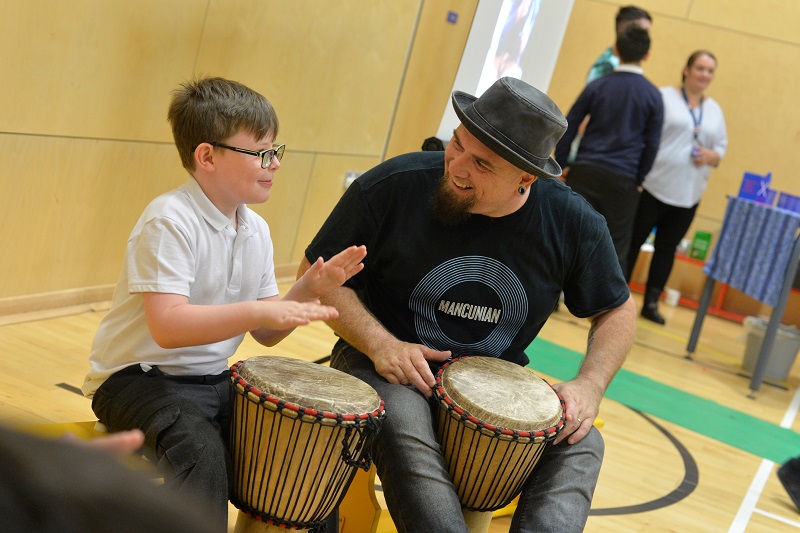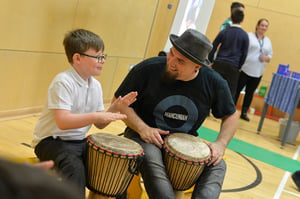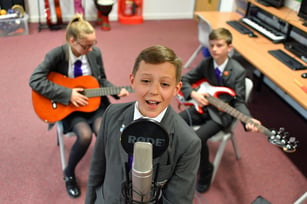
What is arts education for? And what contribution can Arts Award make?
BY: Guest Writer
11 Nov 2019
This is the final blog in a series that has been written by Arts Award moderator and adviser Frances Howard, based on her doctoral research investigating the educational experiences of ‘dis-engaged’ young people undertaking Arts Award. Catch up on the first and second posts to hear about how advisers can co-produce their programmes with young people and ensure they put the arts at the heart of their work. This final post draws on the findings from her research to question why arts education is important and what part the Arts Award can play in this.
 This study has raised questions about the inclusivity of arts education initiatives, where it has been shown the students who start at the most disadvantage often get the lowest quality programmes. Whilst a commitment to improving the lives of young people often underpins much of the work of formal and informal educators, youth workers and arts practitioners; arts education has the potential to contribute to social justice if it shifts its focus to cultural citizenship and cultural democracy.
This study has raised questions about the inclusivity of arts education initiatives, where it has been shown the students who start at the most disadvantage often get the lowest quality programmes. Whilst a commitment to improving the lives of young people often underpins much of the work of formal and informal educators, youth workers and arts practitioners; arts education has the potential to contribute to social justice if it shifts its focus to cultural citizenship and cultural democracy.
There have been recent calls for the reframing of arts education as a process of developing cultural citizenship, which would support young people towards activism, agency and engagement with cultural life. Recent research has identified a key purpose for arts education to develop ‘justice orientated citizens’ (Kuttner 2015) who use their artistic practice to actively promote social justice and address inequalities in society. This approach to arts education sees the arts as a way to connect to particular communities.
Cultural democracy is concerned with each young person having an entitlement to culture so that all young people %20EDIT.jpg?width=300&name=kings%2017.06.19%20(250%20of%201127)%20EDIT.jpg) can become artistic producers. In 2018 Arts Council England published its Cultural Democracy in Practice – a practical guide to embedding cultural democracy within arts projects. This publication highlights key practice and principles as an approach that gives more people a say in deciding what culture is, as well as making and experiencing it. Arts Award holds great potential to be an arts programme that can support participatory democracy and social change for young people.
can become artistic producers. In 2018 Arts Council England published its Cultural Democracy in Practice – a practical guide to embedding cultural democracy within arts projects. This publication highlights key practice and principles as an approach that gives more people a say in deciding what culture is, as well as making and experiencing it. Arts Award holds great potential to be an arts programme that can support participatory democracy and social change for young people.
- Think about raising the profile of the arts within your organisation and re-focus on why they are important for your young people. This may not be for what equivalent qualification they hold, but instead for what they can do for young people. This may not be for the employers they appeal to, but for the ways of being and quality of life young people can have.
- Think about arts engagement as a way of learning to live in the world, the importance of the arts for enabling young people to ‘try on’ identities and imagine new possibilities.
- Think about placing cultural citizenship at the heart of your Arts Award programme so that it can enable an emphasis on participation, activism, belonging, and social change. Check out the creative campaigning resource. This is designed for Arts Award advisers in the youth and community sector who are working alongside young people to support creative social action. The resource includes an interactive tool to help you and your young people to decide how to explore social issues through different art forms.
 We hope that you have enjoyed this series of three blog posts sharing the results and recommendations from the research on the educational experiences of young people undertaking the Arts Award as part of informal education, youth work and alternative education programmes. Our accompanying webinar ‘Co producing arts rich projects with young people’ is taking place on Tuesday 19 November - register now to join.
We hope that you have enjoyed this series of three blog posts sharing the results and recommendations from the research on the educational experiences of young people undertaking the Arts Award as part of informal education, youth work and alternative education programmes. Our accompanying webinar ‘Co producing arts rich projects with young people’ is taking place on Tuesday 19 November - register now to join.
If you are an adviser working with these projects or groups of young people and you want to get in touch to share your story, please contact Dr Frances Howard. Or if you require further support in running your Arts Award programme, please contact us.
Related posts
BY: Cathy Thornhill
BY: Julie Neville
BY: Guest Writer



.jpg)
Comments & Replies